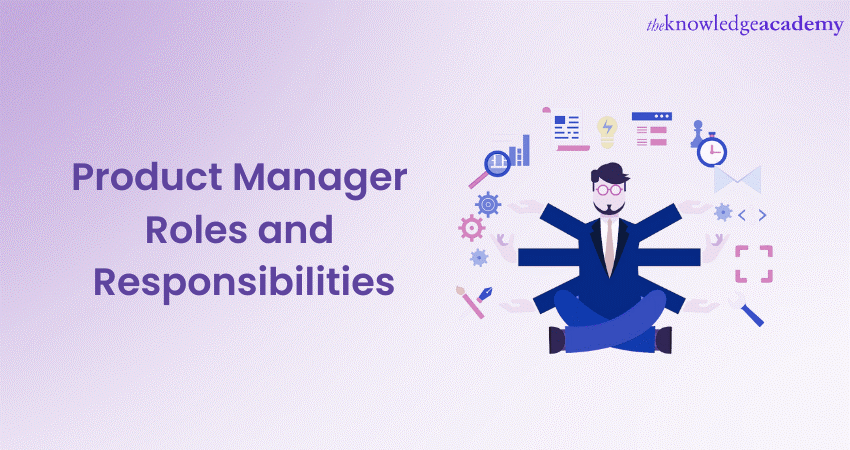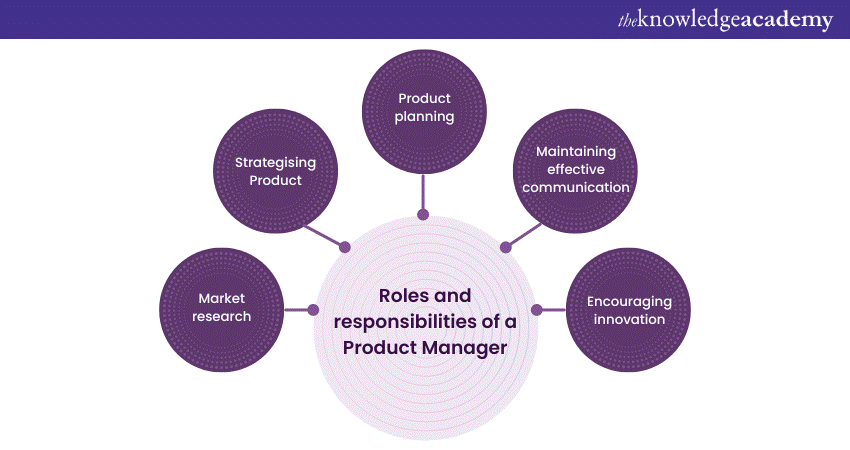We may not have the course you’re looking for. If you enquire or give us a call on +08000201623 and speak to our training experts, we may still be able to help with your training requirements.
Training Outcomes Within Your Budget!
We ensure quality, budget-alignment, and timely delivery by our expert instructors.

Product Management is a critical discipline that plays an important role in the success of any organisation. It requires a multifaceted role that involves understanding customer needs, defining product vision, and guiding the development process from ideation to launch. This is where Product Manager Roles and Responsibilities become very important.
Being a Product Manager is a challenging yet rewarding role. It plays a crucial part in the conception, development, and launch of products, ensuring they align with the company's vision and meet the needs of the target market. Learn more about Product Manager Roles and Responsibilities, which include setting strategy, analysing user data to identify customer needs, and many more.
Table of Contents
1) Understanding Product Management
2) Roles and responsibilities of a Product Manager
a) Market and customer research
b) Product strategy
c) Product planning
d) Prioritisation
e) Communication and collaboration
f) Stakeholder management
g) Risk Management
h) Innovation and creativity
i) User experience and design
j) Business acumen
3) Leading product development
a) Cross-functional coordination
b) Product roadmap execution
c) Agile Methodology
d) Scope management
e) Decision making
f) Quality assurance and testing
4) Conclusion
Understanding Product Management
Product Management is the strategic function within an organisation that focuses on the entire lifecycle of a product or service. It encompasses planning, development, launch, and ongoing improvement of the product. These all come with the aim of creating products that meet customer needs, drive business objectives, and outpace competitors. Product Managers are the champions of the product, serving as the bridge between various stakeholders (such as engineering, marketing, design, sales, etc.) and customers. Let us discuss the roles and responsibilities of a Product Manager in detail.
Roles and responsibilities of a Product Manager
The role of a Product Manager is very diversified. It requires a diverse skill set to excel in this critical position. Product Managers are the visionaries and leaders of the product team, responsible for guiding the product from conception to launch and beyond. The roles and responsibilities of a Product Manager can be explained in the following categories:

Market and customer research
One of the major responsibilities of a Product Manager is to deeply understand the market and customers. This includes conducting thorough market research to detect current trends, industry dynamics, and potential opportunities.
Understanding customer needs, pain points, and preferences is essential for developing a product that resonates with the target audience. Product Managers employ various research methods, such as surveys, interviews, data analysis, etc., to gain valuable insights and make informed decisions.
Product strategy
Product Managers are the architects of the product strategy. They work closely with senior management to align the product vision with the strategy of the company. This entails setting clear product goals and defining a roadmap that outlines the product's journey over time. A well-crafted product strategy ensures that the product remains relevant, competitive, and in line with the organisation's long-term objectives.
Product planning
Turning the product strategy into actionable plans is a critical aspect of a Product Manager's role. They collaborate with cross-functional teams, including engineering, design, marketing, and sales, to create detailed product specifications and define project milestones.
This planning phase involves outlining the features, functionalities, and technical requirements necessary to bring the product to life. Product Managers must also consider resource allocation and timeframes to ensure smooth project execution.
Prioritisation
Product Managers often face the challenge of balancing numerous demands and limited resources. They must prioritise features and enhancements based on their potential impact on the product's success and alignment with the overall strategy.
Prioritisation requires careful consideration of customer feedback, market trends, and the product's long-term vision. Making sound decisions in this regard is vital to delivering products that match customer needs efficiently.
Communication and collaboration
As the central point of contact between various teams, effective communication and collaboration are key traits of successful Product Managers. They must convey the product's vision, objectives, and progress to stakeholders across the organisation, ensuring everyone is on the same page. This involves conducting regular meetings, providing updates, and actively listening to feedback from team members, executives, and customers.
Stakeholder management
Product Managers interact with a diverse group of stakeholders, including executives, developers, designers, marketers, and sales teams. Managing these relationships is crucial for successful product development.
Product Managers must be adept at understanding the perspectives and requirements of each stakeholder and finding common ground to drive the product forward.
Risk Management
The Product Development process involves inherent risks, such as changes in market conditions, technology disruptions, or unexpected challenges during implementation. Product Managers must be proactive in identifying potential risks and developing mitigation strategies. This includes having contingency plans in place and being prepared to adapt quickly to changing circumstances.
Innovation and creativity
Innovation is the lifeblood of successful products. Product Managers must foster a culture of creativity within the product team, encouraging new ideas and out-of-the-box thinking. They should continuously explore ways to enhance the product's value proposition, staying ahead of the competition and anticipating future market trends.
User experience and design
A great product not only meets functional requirements but also offers an exceptional user experience. Product Managers work closely with design teams to ensure that the product is intuitive, visually appealing, and aligns with user expectations. They conduct usability testing and gather feedback to refine the user experience continually.
Business acumen
A deep understanding of the business landscape and financial aspects is vital for Product Managers. They must consider the product's potential return on investment, revenue generation capabilities, and cost implications. Being financially savvy helps Product Managers make data-driven decisions that are aligned with the organisation's bottom line.
Leading product development
Product development is the core point of a Product Manager's role. They play a central role in guiding the product from concept to launch. Leading product development involves a combination of strategic planning, effective communication, and collaboration with cross-functional teams.
Here's a detailed exploration of the key roles and responsibilities of a Product Manager involved in leading product development:
Cross-functional coordination
Product Managers act as a cohesive force that holds various teams together during the product development process. They collaborate with cross-functional teams, including engineering, design, marketing, sales, and customer support.
This is crucial to ensure a unified approach towards achieving the product's goals. By fostering effective communication and collaboration, Product Managers create a shared understanding of the product's vision and requirements.
Product roadmap execution
A product roadmap is a strategic planning that frames the product's journey over time. Product Managers are responsible for ensuring the successful execution of the roadmap. This involves breaking down the roadmap into actionable tasks, setting clear milestones, and closely monitoring progress. If challenges or roadblocks arise, Product Managers work with the team to address them promptly, ensuring the project stays on track.
Agile Methodology
Many product teams adopt Agile Methodologies for development, such as Scrum or Kanban. Product Managers play a pivotal role in implementing and maintaining Agile practices effectively. This includes facilitating sprint planning sessions, daily stand-ups, sprint reviews, and retrospectives. Agile practices promote flexibility, adaptability, and rapid iteration, allowing product teams to respond to changing requirements and market dynamics efficiently.
Scope management
Scope creep, or the continuous expansion of project scope, can be a significant challenge in product development. Product Managers are responsible for managing scope, ensuring that new features or changes align with the product's objectives and do not negatively impact timelines or resources. They use prioritisation techniques and communicate with stakeholders to maintain a balanced scope throughout the project.
Decision making
Product Managers often encounter situations where critical decisions must be made. They rely on data, user feedback, and insights from cross-functional teams to make informed decisions. Balancing different perspectives and considering the potential impact on the product's success, Product Managers arrive at decisions that align with the product strategy and objectives.
Quality assurance and testing
Product Managers work closely with the Quality Assurance (QA) and testing teams to ensure the product meets high-quality standards. They define test cases, validate features against requirements, and ensure that any reported issues are addressed promptly. Product Managers participate in User Acceptance Testing (UAT) to ensure that the final products meet user needs and expectations before release.
Conclusion
Product Manager Roles and Responsibilities combine a set of strategic thinking, communication, leadership and many more. Product Managers are at the forefront of delivering value to customers and driving business success. By understanding their roles and responsibilities, they can effectively navigate the ever-changing landscape of product development, launch, and improvement. It ensures the products remain competitive and relevant in the market.
Embrace the next step in your career journey with our Supply Chain Management Training – Sign up now!
Frequently Asked Questions
Upcoming Business Skills Resources Batches & Dates
Date
 Product Management Training
Product Management Training
Fri 10th Jan 2025
Fri 14th Feb 2025
Fri 11th Apr 2025
Fri 23rd May 2025
Fri 8th Aug 2025
Fri 26th Sep 2025
Fri 21st Nov 2025







 Top Rated Course
Top Rated Course



 If you wish to make any changes to your course, please
If you wish to make any changes to your course, please


